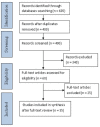Effects of recreational soccer on physical fitness and health indices in sedentary healthy and unhealthy subjects
- PMID: 27274105
- PMCID: PMC4885622
- DOI: 10.5604/20831862.1198209
Effects of recreational soccer on physical fitness and health indices in sedentary healthy and unhealthy subjects
Abstract
Recreational soccer (RS) is becoming a popular alternative to the classical continuous exercise mode used for the improvement of cardiovascular and metabolic fitness in untrained people. The objective of this paper was to conduct a detailed systematic review of the literature, identifying the physiological responses to RS and the training effects of RS on aerobic fitness and health in untrained healthy individuals and clinical patients. PubMed, Google Scholar and ScienceDirect databases were searched using terms related to recreational soccer. Inclusion criteria were randomized controlled trials (RCT) that assessed acute physiological responses to RS or the training effects of RS on physical fitness and health in sedentary, untrained subjects of any age or health status. All studies were assessed for methodological quality using the PEDro scale. Thirty-five articles met the inclusion criteria; seven examined the acute response to RS, and 28 assessed training effects. Clear evidence was found that RS had positive effects on many health-related indices and variables, including VO2max (gains of 7-16%), blood pressure (reductions of 6-13 mmHg), body composition (decreased fat mass and improved indices of bone health), and metabolic and cardiac function. These positive effects were observed in both healthy individuals and clinical patients, irrespective of age or sex. Although this review provides clear evidence of the positive effects of RS on health, most studies had limitations of methodology (an average PEDro score < 6). Furthermore, many of the training studies were from a small number of research groups. Future studies should be extended to other countries and institutions to ensure generality of the results. Regular RS training leads to significant cardiovascular and muscular adaptations and gains of health both in sedentary individuals and clinical patients at all ages, suggesting that RS is a potentially highly motivational method to enhance population health.
Keywords: Blood pressure; Football; Heart rate; Recreational; Small-sided game; Soccer.
Figures
References
-
- Lee I-M, Skerrett PJ. Physical activity and all-cause mortality: what is the dose-response relation? Med Sci Sports Exerc. 2001;33(6) SUPP:S459–S471. - PubMed
-
- Mokdad AH, Bowman BA, Ford ES, Vinicor F, Marks JS, Koplan JP. The continuing epidemics of obesity and diabetes in the United States. JAMA. 2001;286(10):1195–200. - PubMed
-
- Nybo L, Pedersen K, Christensen B, Aagaard P, Brandt N, Kiens B. Impact of carbohydrate supplementation during endurance training on glycogen storage and performance. Acta physiologica. 2009;197(2):117–27. - PubMed
-
- Duvivier BM, Schaper NC, Bremers MA, van Crombrugge G, Menheere PP, Kars M, Savelberg HH. Minimal intensity physical activity (standing and walking) of longer duration improves insulin action and plasma lipids more than shorter periods of moderate to vigorous exercise (cycling) in sedentary subjects when energy expenditure is comparable. PLoS One. 2013;8(2):e55542. - PMC - PubMed
-
- Helge EW, Aagaard P, Jakobsen MD, Sundstrup E, Randers MB, Karlsson MK, Krustrup P. Recreational football training decreases risk factors for bone fractures in untrained premenopausal women. Scand J Med Sci Sports. 2010;20(s1):31–9. - PubMed
LinkOut - more resources
Full Text Sources
Other Literature Sources
Miscellaneous

